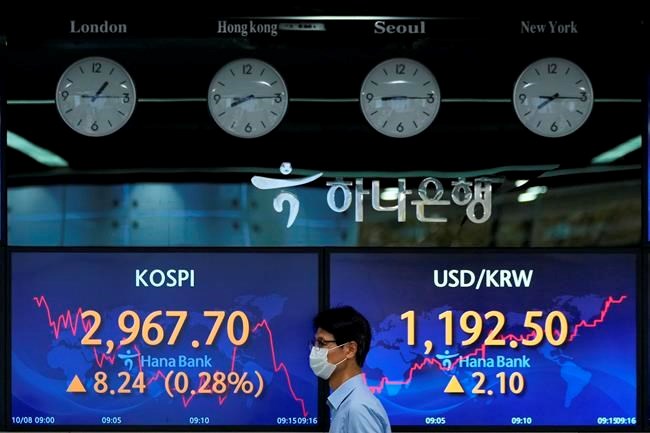TORONTO — Canada's main stock index closed essentially unchanged Friday even as crude oil prices surpassed US$80 for the first time in seven years and a strong September jobs report saw employment return to pre-pandemic levels for the first time.
The S&P/TSX composite index dropped near the end of trading to conclude the day up just one-tenth of a point to 20,416.31 after hitting an intraday high of 20,510.74.
The Toronto market gained 1.3 per cent on the week, 1.7 per cent since the start of October and 17.1 per cent so far in 2021.
"It has been a good start to October after a rough September and energy and material sectors have definitely been leading the way this month," said Michael Currie, vice-president and investment adviser at TD Wealth.
In New York, the Dow Jones industrial average was down 8.69 points at 34,746.25. The S&P 500 index was down 8.42 points at 4,391.34 while the Nasdaq composite was down 74.48 points at 14,579.54.
U.S. stock markets dipped following a disappointing non-farm payrolls report that showed hiring increased by just 194,000 jobs last month. That's far less than expected but the unemployment rate fell to 4.8 per cent while average hourly wages rose 0.6 per cent.
In Canada, 157,000 jobs were gained in September while the unemployment rate dipped to 6.9 per cent, from 7.1 per cent in August but remained above pre-pandemic levels.
Both employment reports likely signal that the Bank of Canada will further taper its bond-buying later this month and the U.S. Federal Reserve won't be deterred from beginning to cut its stimulus, Currie said in an interview.
In Canada, he said it was "a very good economic number which would gear you towards rates rising sooner than later."
However, Currie noted a speech Thursday by Bank of Canada governor Tiff Macklem in which he expressed concern about inflation being a little bit worse than anticipated.
The energy sector led the TSX, gaining 1.8 per cent to push it to its highest level since May 2019.
Suncor Energy Inc. climbed 2.9 per cent while Cenovus Energy Inc. rose 2.7 per cent.
The November crude contract was up US$1.05 at US$79.35 per barrel after reaching a high of US$80.11, while the November natural gas contract was down 11.2 cents at nearly US$5.57 per mmBTU.
Crude oil prices increased for a seventh-straight week, gaining 4.6 per cent on the week and 63.5 per cent year-to-date.
The crude oil price move helped the Canadian dollar which reached 80.12 cents US, its highest level since July 30 and compared with 79.63 cents US on Thursday.
Financials, materials and consumer discretionary sectors were also up on the day.
Financials was helped by rising bond yields while materials increased despite lower gold prices.
The December gold contract was down US$1.80 at US$1,757.40 an ounce and the December copper contract was up 3.2 cents at almost US$4.28 a pound.
Health care and technology were the biggest laggards.
The cannabis sector lost 2.6 per cent as shares of Tilray Inc. fell 5.4 per cent.
Technology moved lower on Lightspeed Commerce Inc. and Dye and Durham Ltd. dropping 7.1 and 5.8 per cent, respectively.
This report by The Canadian Press was first published Oct. 8, 2021.
Companies in this story: (TSX:LSPD, TSX:DND, TSX:SU, TSX:CVE, TSX:GSPTSE, TSX:CADUSD=X)
Ross Marowits, The Canadian Press



